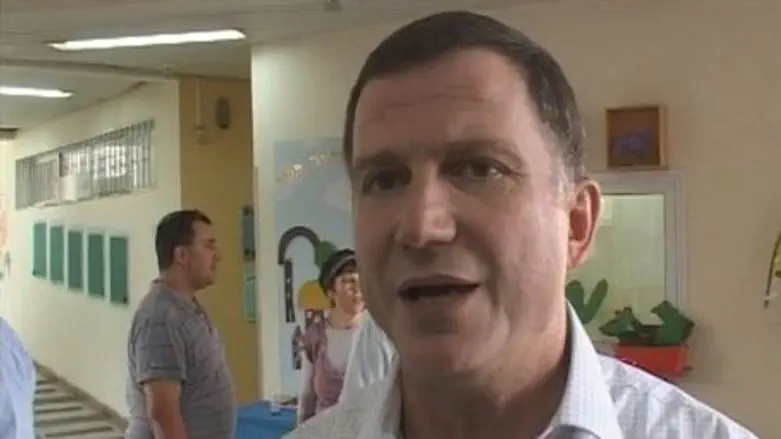
Diaspora and Information Minister Yuli Edelstein addressed on Monday a series of issues which have arisen from U.S. President Barack Obama’s recent speeches and the subsequent reaction of Prime Minister Binyamin Netanyahu.
Speaking to Arutz Sheva’s Hebrew website, Edelstein, a resident of Gush Etzion in Judea, said that although his neighbors often have tough questions for him as a minister in a government which has spoken publicly of the possibility of establishing a Palestinian state, he considers these meetings with neighbors a democratic tool, since he is able to present these questions to the prime minister and the other government ministers. In this way, he explained, he brings to the government table the feelings of the Jewish residents of Judea and Samaria. “Our democracy is a representative democracy, and I try to make our voice heard,” he said.
Edelstein also expressed his appreciation over the way Netanyahu clearly expressed his position to President Obama following his speech at the State Department last Thursday. He added that he believes that Netanyahu’s words during his meeting on Friday with Obama influenced the President and led to the changes in the speech he delivered to the AIPAC Conference on Sunday.
“You cannot otherwise explain the differences between the two speeches,” said Edelstein, who emphasized that the difference between the speeches went far beyond Obama explaining his position regarding Israel’s withdrawal to the 1949 armistice lines.
Edelstein noted that in his second speech, Obama also addressed the issue of Hamas and the fact that negotiations cannot be held with the PA while Hamas is part of its government. In Thursday’s speech, however, Obama only saw the unity agreement between Hamas and Fatah as a “minor glitch.”
When asked whether he finds that there is a fundamental difference between Netanyahu’s reference to ‘settlement blocs’ and Obama’s remarks on boundary adjustments based on the 1949 armistice lines, which are two descriptions of the negotiation parameters, Edelstein said that he believes that there is a fundamental difference between Obama’s and Netanyahu’s perceptions.
He explained that Netanyahu sees the settlement blocs as remaining a part of Israeli territory under any agreement and the rest as area to be negotiated, whereas Obama sees the 1949 armistice lines as a starting point from which the parties will begin to discuss the completion of negotiations.
Edelstein noted that the PA Arabs would be very interested in accepting Obama’s viewpoint as it would give them much more territory to begin with, and they would also be able to present Israel as rejecting peace when they approach the UN in September. He added that he believes that if the PA leadership presents this viewpoint, they will easily be able to achieve the sympathy of the United Nations.
During the interview, Edelstein addressed the question of whether Netanyahu has adopted the platform of Kadima when he talks about the settlement blocs. He explained that he himself does not like the use of terms such as ‘settlement blocs’, but noted that there are significant differences between Netanyahu and Kadima.
He explained that there is a fundamental difference between Kadima in the earlier days of former Prime Minister Ariel Sharon and present-day Kadima.
“Kadima members have turned left and their twin sister is Meretz,” he said. “The vast majority of them, except for one or two sane members, are calling on Netanyahu to accept the 1967 principles, despite the fact that no previous Prime Minister, not even Yitzchak Rabin and Shimon Peres, has ever accepted those principles.
“There are those in Kadima who feel that 1967 was a failure and a mistake to be corrected,” he continued. “On the other hand, Prime Minister Netanyahu sees in Judea and Samaria a part of the homeland and, based on this concept, he determined that the settlement blocs will remain ours while we will simultaneously continue to seek the path to peace.”
Addressing Israel’s preparations for September, Edelstein said that the preparations are conducted at several levels. One level is the diplomatic one, where Israel is making an effort to isolate countries that support the PA’s approach. The second level is through public relations activities on the Internet and in the media, in an effort to justify Israel’s political policy. In this regard, he noted that his ministry works online to define basic terms in the conflict to those who may not be aware what they mean.
Edelstein noted that he is aware that the chance of an Israeli victory in this arena is small, but he hopes to at least achieve some balance. “I do not think I can convince the Arab League or the radical left,” he said, “but I can certainly convince the general public.”
